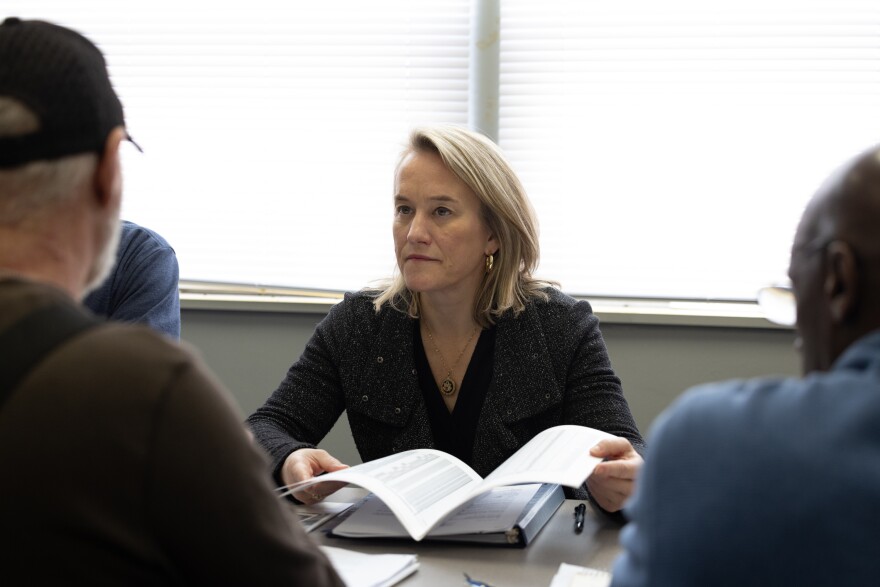While it served as a monumental win for Missouri residents who’ve long argued for their inclusion in a federal compensation program for radiation exposure, the Metro East didn’t make it in the latest expansion passed by Congress.
As part of the “One Big Beautiful Bill” that President Donald Trump signed into law recently, residents of 21 ZIP codes in St. Louis, St. Louis County and St. Charles County are now eligible to seek $50,000 payments through the Radiation Exposure Compensation Act.
However, residents of Venice, Madison and Granite City will again be stuck waiting to be included in the fund for people with radiation-related illnesses tied to Manhattan Project-era nuclear bomb making, after their single Illinois ZIP code didn’t make it in the final bill. The latest action by Congress serves as another example of the Metro East victims going unnoticed in their fight for compensation.
“This small group of people here in Venice and Madison in Illinois have been left out once again,” said Larry Burgan, a former employee of the factory that processed uranium and thorium and a longtime advocate for RECA. “In part, I believe it’s because of their status, where they stand in life: They’re a poor Black community.”

U.S. Rep. Nikki Budzinski, D-Springfield, has continued to push for the inclusion of the 62060 ZIP code in the federal legislation, but she’s been unable to convince her colleagues.
“I don't want to take away the fact that there was some progress made: getting restitution, getting compensation for people that very well deserve it,” she said. “But I think there are others that were left behind.”
Despite being snubbed by Congress, Burgan feels optimistic that the community that surrounds the factory that straddles the Venice and Madison municipal boundary could eventually make it into future legislation. After all, RECA had sunset last year prior to being revived in this latest legislation, he said.
“Now, we may not be included, but at least it is back and it is helping someone: the residents over in Missouri,” Burgan said. “So, no, I can't feel bad about it. I can feel bad the residents over here were left out, but I'm glad they brought this back from retirement.”
The importance of the single Illinois ZIP code’s inclusion stems from that factory’s contract with Mallinckrodt Chemical Works to process radioactive metals in the late 1950s and early '60s. The cleanup of the site wasn’t finished until 2007, according to government records.

While former employees of the site have been able to seek government assistance, the residents who live around it haven’t been eligible for compensation.
An informal survey done by Burgan and fellow advocate Calvin Ratliff starting in 2009 found 368 cancer cases among residents in a six-block radius of the factory. No government agency appears to have formally documented the cancer rates or health outcomes of residents in the community surrounding the plant.
Budzinski wonders if the expansion of RECA to places like Missouri played a role in helping get enough votes to pass the One Big Beautiful Bill by small GOP margins in Congress.
“It was a backroom deal made to, I think, bring on board the support of senators that had been previously probably holding out their support for the bill,” Budzinski said.
U.S. Sen. Josh Hawley, R-Missouri, had previously expressed deep skepticism about the legislation, saying cuts to Medicaid would cause his constituents to lose health coverage and rural hospitals would close. However, Hawley ended up voting for the bill.
“It just seems coincidental, or not coincidental, that it benefited some of the senators that were holdouts,” Budzinski said.

ZIP codes in Alaska, Kentucky and Tennessee were also added to the compensation program.
When asked about future expansion to states like Illinois, Hawley, who’s championed Missouri’s inclusion in RECA in recent years, recently expressed interest.
“I think there's more work to do, and we're happy to look at it site by site,” Hawley said last week when celebrating RECA’s expansion.
Illinois wasn’t the only state to miss out on RECA’s expansion. Pennsylvania, Ohio and Washington had been included in previous legislative proposals. U.S. Rep. Wesley Bell, D-St. Louis County, also said he’d like to add two ZIP codes in St. Louis.
“We need to kind of come together with other like-minded districts, other like-minded states, that might not have been included in this first reauthorization and just fight together,” Budzinski said. “I think there's solidarity in numbers. We're not alone. We're not the only ZIP code that deserves to be included and was not.”
After all his advocacy for the former employees and residents of the Metro East harmed by radiation, Burgan said he’s learned an important lesson: You can’t help everyone all at once.
“If we could do it piecemeal and work our way to it, hopefully, maybe Congress could include this small group of residents over here in Illinois,” he said.







